
Worms can live for a long time in the human body without showing any sign of their presence. The main symptoms of parasitic infection appear much later, when they often resemble symptoms of other diseases. A person can search for the cause of their disease for a long time and be treated for a completely different disease, although the solution to the problem lies in infection with worms.
Usually, parasites are suspected at later stages, when treatment for other diseases does not help. At this point, the worms in the body reach maturity and it becomes more difficult to eliminate them. It is important to be able to recognize symptoms as they appear and to immediately diagnose whether the parasitic infection is the cause of frequent allergic rashes and other unpleasant illnesses.
What types of worms can a person have?
Worms are a common name for a number of parasites. There are about a hundred of them in total, of which a small group of the most common representatives can be distinguished, which should be mentioned separately.
Pinworms
Pinworms are the most common type of helminthic infestation that affects adults and children. Their presence is the easiest to determine. This type of worm lays its eggs on the skin between the buttocks. Therefore, a single scratch is often sufficient to determine the presence of pinworms.
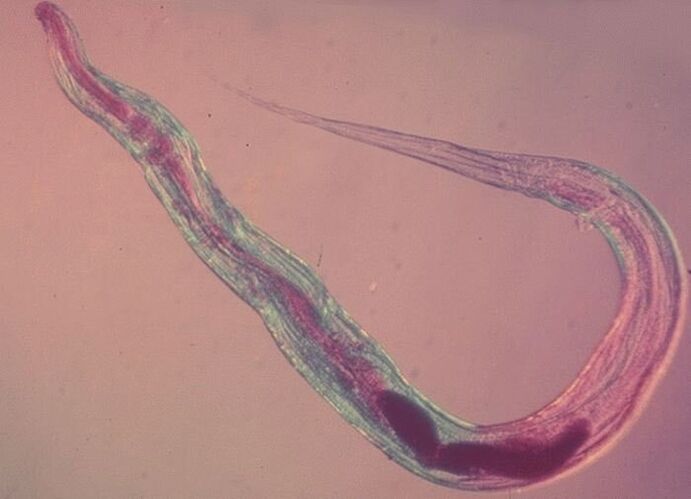
Round worm
The "target" of roundworms is the respiratory tract. With ascariasis, copious sputum is released when coughing. If you take it for analysis, you may find traces of parasitic damage in it. An increase in body temperature is also likely.
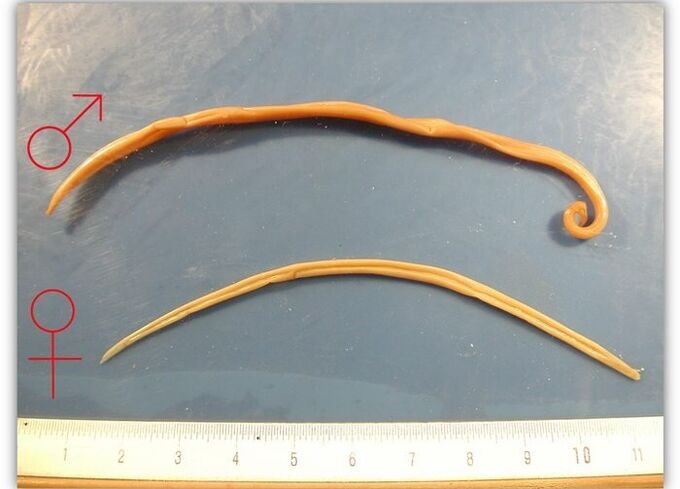
Trichinella
These parasites are the most difficult to detect - they attach themselves to the intestinal wall and do not come out like pinworms. Trichinosis has the highest death rate among all types of helminthic lesions - it is a difficult disease to treat. With lymphatic flow, Trichinella capsules can spread throughout the body.
The symptomatology of this lesion is more akin to typhoid fever.
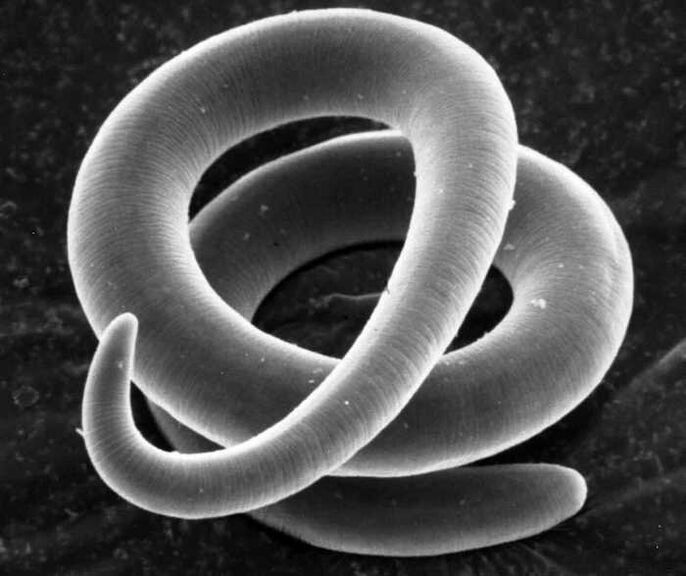
Trematodes
Trematodes are flatworms that affect the liver, lungs, and blood. Infection usually occurs in contaminated water or by eating undercooked meat.
There are other types of helminthic lesions, but they are not as dangerous or extensive. The main symptoms and treatment of all helminthic invasions are similar.
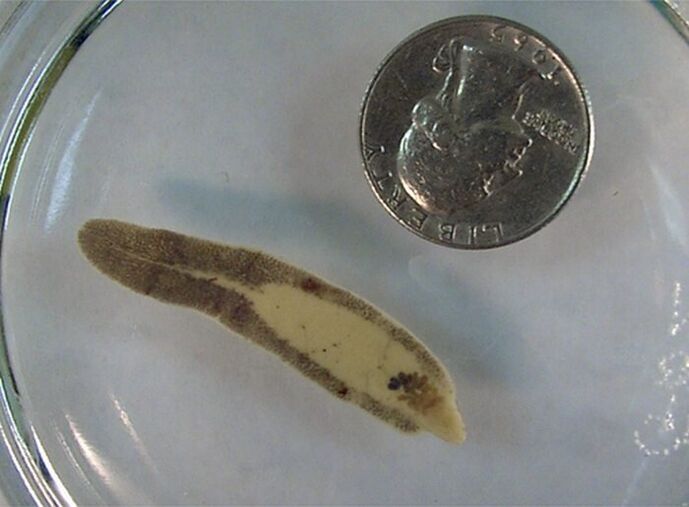
Symptoms
The symptoms of helminthic lesions are varied. If most of them are present, it is worth considering the likely parasite invasion and making a diagnosis.
- Bloating, increased gas production, any other problem related to the work of the large intestine.
- Frequent constipation or diarrhea. Depends on the stage of development of the parasites. Constipation occurs when the worm specimens grow large and block the passage of the intestines with clots. Diarrhea indicates that long individuals interfere with the secretion of bile.
- Allergic reactions. Particularly noticeable if the person is not allergic. Allergies can manifest themselves in different forms - rashes, eczema, the appearance of boils and papillomas.
- Cough. Often dry, with no other cold symptoms. Cough suppressants and antibiotics do not solve the problem.
- Inflammatory diseases of the respiratory system. The worms can migrate through the body and reach the respiratory tract. It can cause bronchitis, pneumonia, asthma.
- Itching in the anal area. Associated with the release of parasites for egg laying. Appears mainly at night.
- Joint and muscle pain. They also appear due to the movement of parasites through the body.
- Grinding of teeth - bruxism. It is associated with an increase in the activity of the nervous system during a parasitic infection. Appears during sleep.
- Chronic fatigue and depression-like condition. The wastes from worms literally poison the body, which leads to a deterioration in the well-being of the whole person.
- All manifestations of reduced immunity, frequent colds. It can be difficult to heal quickly.
If most of these symptoms are observed, the likelihood of worms is high. It is best to immediately perform a series of diagnostic tests to confirm or deny this assumption.
Important! Any of these symptoms should be referred to a specialist immediately. These signs can speak not only of helminthic lesions, but also of other serious diseases.
Diagnostic
When worms are affected, the diagnosis cannot be made by the presence of symptoms alone. A number of studies should be done. Some of them give almost 100% accurate results.
- Various microscopic examinations of feces and scrapings. These methods are the cheapest and most common, but they do not give a 100% reliable result. It is possible to recognize worms with the help of these scans only at the time of laying, otherwise their presence will be invisible.
- ELISA - enzyme-linked immunosorbent assay. This method gives an extremely accurate result, helps to determine the stage of development of worms and their type. The only downside to this analysis is the fairly high cost of its performance.
- Hemoscanning. This method can help refute or confirm the presence of worms in the body. With this blood test, traces of their vital activity and intoxication will be noticeable. The essence of this method lies in the study of the "living" blood taken earlier.
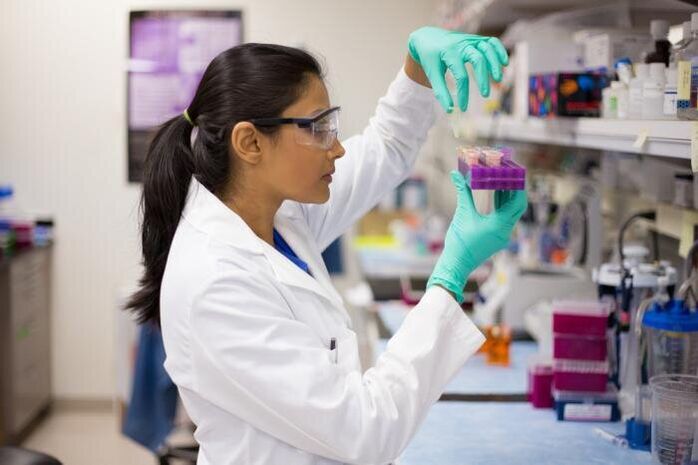
Important! It is generally advisable to go through several studies to confirm the result.
Which doctor treats?
If a helminthic invasion is suspected, it is best to contact a regular therapist and describe the situation to them. If tests to determine the presence of parasites have already been carried out independently, they should be taken with you.
The therapist will direct you to the most appropriate doctor for the specific situation. If the worms are concentrated in the gastrointestinal tract, a specialist will recommend a gastroenterologist. This happens in most cases, as the bulk of the parasites live in the intestines.

In some cases, consultation with a parasitologist or specialist in parasitic diseases is required. But these narrow-profile doctors are far from being everywhere, therefore, situations that do not go beyond the scope of a typical infection are entirely submitted to the attending physician.
Home therapy
Immediately after detection of the disease, treatment should be started. Most anthelmintic drugs have many side effects, so it is recommended that you take them under the supervision of your doctor.
Medicines are different, depending on the type of worm that infects the body. In general, all drugs can be divided into several groups.
- Medicines for nematodes, which include pinworms and roundworms.
- Remedies for cestodes - tapeworms, which include bovine tapeworm, small tapeworm, echinococcus.
- Medicines against trematodes, tapeworms.
Important! It should be remembered that anthelmintic drugs are very toxic, they should be taken with caution.
Take medication for prophylaxis
Since taking anthelmintic drugs has a large number of negative effects, it is not recommended to take it like this, for the purpose of prevention, if there is no increased risk of infection. Infection can happen on any day: if you take a pill today, you can get sick tomorrow.
There is a small list of indications for taking prophylactic drugs against worms:
- The appearance of worms in a family member or a person living in the same apartment. We can infect others. Therefore, if helminths are found in one of the family members, then everyone else is recommended to take prophylactic anthelmintic drugs.

- If a child goes to kindergarten, he and his parents, brothers or sisters are also advised to take antihelminthic drugs as a preventive measure. It is believed that in a closed children's collective there is an increased risk of the spread of parasites.
- Pets. If there are cats or dogs in the house, especially if they are often on the street, owners are advised to carry out prophylaxis with antiparasitic drugs.
- Contact with the ground, work with it. Especially for summer residents and wildlife lovers.
- Constant trips to exotic countries. There is a high probability of bringing a rare parasite from southern countries, then treatment will be complicated by the inability to quickly determine its type.
- Wildlife recreation. These include hiking, fishing, hunting.
Only in these cases, prophylactic administration of anthelmintic drugs is allowed and beneficial.
Treatment with folk remedies
Often popular antiparasitic drugs come to the aid of worm pills. You have to be careful with them - some of them are dangerous or can be harmful if mistreated.
Bowel cleansing
Sometimes cleaning the intestines with enemas is recommended after taking anthelmintics to literally remove the dying parasites. The rationality of this method is questionable, but the usual enema with water is not dangerous - it can be done for your own peace of mind.
Some people recommend doing an enema with baking soda or salt - this method is even more controversial. Soda and salt can burn the mucous membrane and upset the water balance, so you shouldn't use it. In addition, most parasites live in another part of the intestine. This method should be rejected as a last resort.

Garlic treatment
It is known that worms are afraid of sharp and hot foods. Therefore, during processing, you can add more garlic to the diet as a seasoning. You can also eat several cloves in the morning with a glass of milk. Then you need to empty your bowels and have breakfast. You can do it without milk - it's just that this product makes garlic easier to take.
Introducing tampons soaked in garlic juice into the anus is not recommended. May cause allergies and burns.
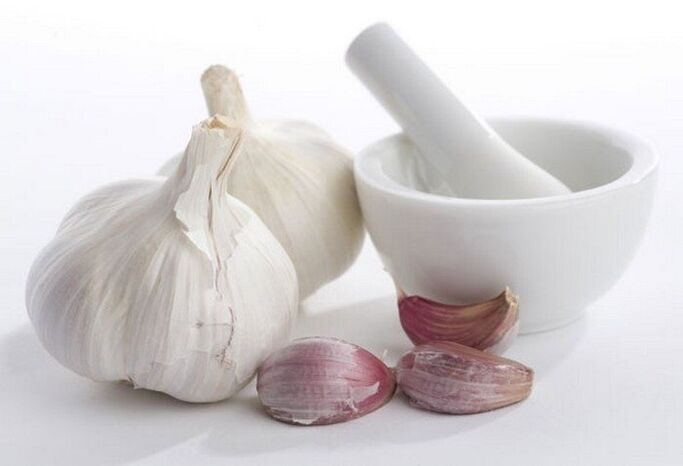
Pumpkin seeds
Another effective folk remedy for the treatment and prevention of parasitic diseases is pumpkin seeds. There are several methods of taking them to combat worms.
On an empty stomach every morning you need to eat a few tablespoons of pumpkin seeds. Then you should wait about an hour and empty the bowels. If this cannot be done, you need to take a laxative. Then you can have breakfast.
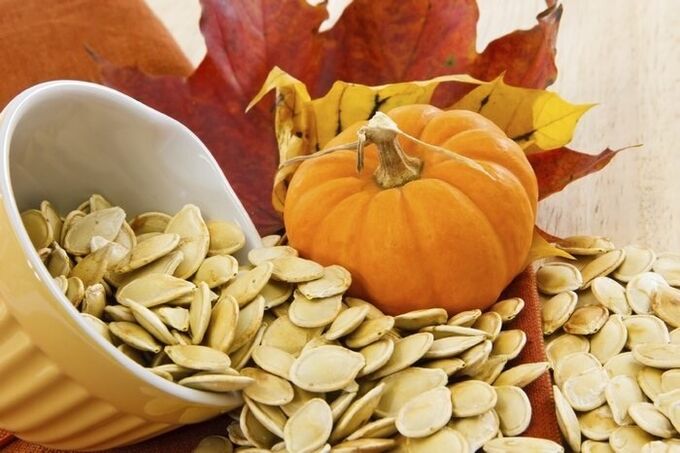
For the second method, you need to mix a glass of ground roasted pumpkin seeds with a glass of honey and a spoonful of baking soda. Infuse this mixture for ten days in a dark place. Use only glassware. The ready-to-use mixture should be consumed in a spoon every morning, well before meals.
Important! If you are allergic to folk remedies, they should be abandoned.
Prophylaxis
The main prevention of parasitic diseases is to keep the body and the house clean. After using the toilet, coming from the street, you should wash your hands thoroughly with soap and water. You cannot share towels, toothbrushes, combs with other people, even if they are family members.
Meat and fish should be rinsed before cooking and cooked through. Wash fruits and vegetables thoroughly, preferably pour boiling water over them before use.

It is not worth taking antihelminthic drugs as a preventive measure, but periodically you can rely more on spicy foods, garlic. For the same purpose, pumpkin seeds can be introduced into the diet.
Knowing all the symptoms and possible manifestations of parasitic diseases, they can be detected at an early stage, after which they can be cured quickly and painlessly.






































